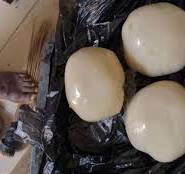By Achadu Gabriel, Kaduna
As the economic hardship triggered by the removal of fuel subsidies worsens, the size of one of Nigeria’s most affordable staple foods—Nkpu, Akpu, or Fufu—has drastically reduced to the size of an egg.
Popularly known by various tribes as Nkpu, Akpu, or Fufu, this carbohydrate-rich, high-energy food is believed to have originated from the South-Eastern region of Nigeria, either before or after the Biafran war. Although the exact timeline remains contested, the product, a by-product of cassava, is widely consumed across the country.
In Benue State, for instance, it is a staple among communities such as the Agilas, Ezahs, Igwumales, Utonkon/Ufiahs, Ulai, Edumoga, and other areas in Idoma land. In some regions, it is pounded using a mortar before being served with soup.
Before the introduction of other cassava by-products like garri, cassava flour, and cassava powder, Akpu and Fufu were the primary cassava-based foods, especially in Eastern and Middle Belt regions of Nigeria.
Today, Akpu, which previously sold for ₦100 per portion—large enough for a full meal—is now reduced to an egg-sized portion but still sold at the same price. According to market surveys conducted in Kaduna, what used to be a single portion is now divided into four smaller pieces.
Cassava, a versatile crop in Nigeria, is also used for various other foods, including boiled cassava, fried cassava, and cassava cakes (locally known as quasi). However, the rising costs of these products have placed them increasingly out of reach for ordinary Nigerians.





